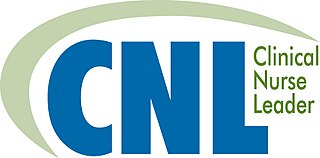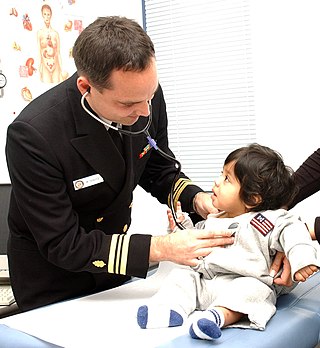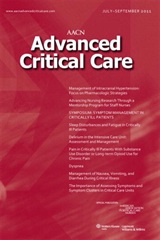An advanced practice nurse (APN) is a nurse with post-graduate education and training in nursing. Nurses practicing at this level may work in either a specialist or generalist capacity. APNs are prepared with advanced didactic and clinical education, knowledge, skills, and scope of practice in nursing.
The Doctor of Nursing Practice (DNP) is a professional degree in nursing in the United States of America.
Nursing credentials and certifications are the various credentials and certifications that a person must have to practice nursing legally. Nurses' postnominal letters reflect their credentials—that is, their achievements in nursing education, licensure, certification, and fellowship. The letters usually appear in the following order:
A clinical nurse specialist (CNS) is an advanced practice nurse who can provide advice related to specific conditions or treatment pathways. According to the International Council of Nurses (ICN), an Advanced Practice Nurse is a registered nurse who has acquired the expert knowledge base, complex decision-making skills and clinical competencies for expanded practice, the characteristics of which are shaped by the context and/or country in which s/he is credentialed to practice.
The American Association of Critical-Care Nurses’ (AACN) developed the synergy model of patient care as a conceptual framework for their critical care nurse certification program. This midlevel nursing theory identifies core competencies necessary for critical care nurses while providing structure for the AACN certification exam.

Critical care nursing is the field of nursing with a focus on the utmost care of the critically ill or unstable patients following extensive injury, surgery or life-threatening diseases. Critical care nurses can be found working in a wide variety of environments and specialties, such as general intensive care units, medical intensive care units, surgical intensive care units, trauma intensive care units, coronary care units, cardiothoracic intensive care units, burns unit, paediatrics and some trauma center emergency departments. These specialists generally take care of critically ill patients who require mechanical ventilation by way of endotracheal intubation and/or titratable vasoactive intravenous medications.

Clinical Nurse Leader (CNL) is a nursing role that was developed in the United States to prepare highly skilled nurses focused on the improvement of quality and safety outcomes for patients or patient populations. The CNL is a registered nurse, with a Master of Science in Nursing who has completed advanced nursing coursework, including classes in pathophysiology, clinical assessment, finance management, epidemiology, healthcare systems leadership, clinical informatics, and pharmacology. CNLs are healthcare systems specialists that oversee patient care coordination, assess health risks, develop quality improvement strategies, facilitate team communication, and implement evidence-based solutions at the unit (microsystem) level. CNLs often work with clinical nurse specialists to help plan and coordinate complex patient care.

A family nurse practitioner (FNP) provides continuing and comprehensive healthcare for the individual and family across all ages, genders, diseases, and body systems. Primary care emphasizes the holistic nature of health and it is based on knowledge of the patient in the context of the family and the community, emphasizing disease prevention and health promotion.
The Uniform Advantage/AACN Graduate Nursing Student Academy Scholarship is an award that acknowledges the important role nurses play in the health care system. It was developed based on a commitment to improving access to nursing students enrolled in master's and doctoral programs.
The American Association of Colleges of Nursing (AACN) is a national organization of nurses in the United States that is dedicated to advancing nursing education. It was established in 1969, and represents more than 875 member schools of nursing at public and private universities nationwide.
Thomas Ahrens is an American nurse, researcher, and educator at Barnes-Jewish Hospital specializing in critical-care nursing.

AACN Advanced Critical Care is a peer-reviewed nursing journal and an official publication of the American Association of Critical Care Nurses. It is intended for "experienced critical care and acute care clinicians at the bedside, advanced practice nurses, and clinical and academic educators."
Marlene F. Kramer was an American nurse, educator and author. She wrote a 1974 book, Reality Shock: Why Nurses Leave Nursing, which examined burnout in the nursing profession. Her book has been widely cited in subsequent studies on retention and satisfaction within nursing.
Nursing is the largest healthcare profession in the United States, with more than 3.1 million registered nurses. Between 2012 and 2022, employment for nurses is projected to grow by 19 percent, which is more than any other profession. Nurses make up the largest component of staff in hospitals but are also able to provide care in clinic settings, patient's homes, schools, nursing homes, public health agencies, and mental health centers. In addition, nurses can be found in the military, in industry, nursing education, and do health care research. Nurses in these various roles and settings can provide direct patient care and case management, but also develop and establish nursing practice and quality standards within complex healthcare systems. As each degree can provide a different level of care for patients and function in vastly different roles, it is important to differentiate between them. The levels of nursing degrees have different educational requirements, licensure, and credentialing that can vary state to state.
An acute care nurse practitioner (ACNP) is a registered nurse who has completed an accredited graduate-level educational program that prepares them as a nurse practitioner. This program includes supervised clinical practice to acquire advanced knowledge, skills, and abilities. This education and training qualifies them to independently: (1) perform comprehensive health assessments; (2) order and interpret the full spectrum of diagnostic tests and procedures; (3) use a differential diagnosis to reach a medical diagnosis; and (4) order, provide, and evaluate the outcomes of interventions. The purpose of the ACNP is to provide advanced nursing care across the continuum of health care services to meet the specialized physiologic and psychological needs of patients with acute, critical, and/or complex chronic health conditions. This care is continuous and comprehensive and may be provided in any setting where the patient may be found. The ACNP is a licensed independent practitioner and may autonomously provide care. Whenever appropriate, the ACNP considers formal consultation and/or collaboration involving patients, caregivers, nurses, physicians, and other members of the interprofessional team.
The End-of-Life Nursing Education Consortium (ELNEC) project is a national education initiative whose mission is to improve palliative care. The project provides an undergraduate and graduate nursing faculty, CE providers, staff development educators, specialty nurses in pediatrics, oncology, critical care, and geriatrics, and other nurses with training in palliative care so they can teach this information to nursing students and practicing nurses. ELNEC is a partnership between the American Association of Colleges of Nursing (AACN), Washington, DC and the City of Hope, Duarte, CA. The project provides undergraduate and graduate nursing faculty, CE providers, staff development educators, specialty nurses in pediatrics, oncology, critical care, and geriatrics, and other nurses with palliative care training. Once trained, these healthcare professionals go on to teach this essential information to nursing students and practicing nurses. The project, which began in February 2000, was initially funded by a major grant from The Robert Wood Johnson Foundation (RWJF). The National Cancer Institute (NCI), American Association of Colleges of Nursing (AACN), US Cancer Pain Relief Committee, the Aetna, Archstone, Oncology Nursing, California HealthCare, Milbank, Stupski, Open Society, and Cambia Health Foundations, and the Department of Veterans Affairs (VA) have provided additional funding.
Azita Emami is a Linda Koch Lorimer Professor and the Dean of Nursing at Yale School of Nursing since 2023. She is the former Robert G. and Jean A. Reid Dean of Nursing at the University of Washington from 2018 to 2023. She is also a Fellow of the American Academy of Nursing.
Dorrie K. Fontaine is an American educator, author, dean, and critical care nurse. She is known best for her academic leadership at the University of Virginia School of Nursing.



